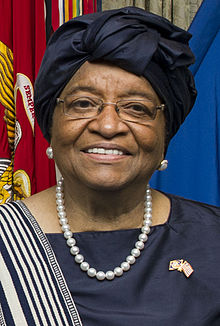Ellen Johnson Sirleaf: Africa's 1st Elected Female Head of State
Ellen Johnson Sirleaf became Africa's first elected female of state in 2006. She served two terms as President of Liberia and was the recipient of the Noble Peace Prize and other well-known international awards.
Ellen and James were divorced in 1961, and Ellen got her college degree and then went to the United States for graduate study, earning a Master of Public Administration from Harvard University's John F. Kennedy School of Government in 1971. Sirleaf then returned to Liberia and went to work in the government, as Assistant Minister of Finance of President William Tolbert. She later served as Minister of Finance. When a military man, Samuel Doe, seized control of the government, in 1980, Sirleaf initially served as President of the Liberian Bank for Development and Investment but later left the country after a disagreement with the military leader. She had run for Vice-president, as the running mate of Jackson Doe, in 1985 but ran afoul of the government and was jailed for a time. After she was released, she returned to the U.S., went to Washington, D.C., and started working for the World Bank. Sirleaf had a job with Citibank in Nairobi, Kenya, in the 1980s and then a job with Equator Bank. She was appointed Director of the United Nations Development Programme's Regional Buruea for Africa in the early 1990s but left that job in 1997 in order to run for President. The winner of that election was Charles Taylor, whom Sirleaf had supported in a rebellion against the Doe government in 1989. Sirleaf protested the results of the 1997 presidential election and, facing charges of treason, left the country, going into exile in Ivory Coast. With Taylor gone, Sirleaf returned and again represented the Unity Party. This time, in 2005, she won the presidency. Attending her inauguration, on Jan. 16, 2006, were American First Lady Barbara Bush and Secretary of State Condoleezza Rice. Sirleaf was re-elected in 2011. In that same year, she was awarded the Nobel Peace Prize, along with Leymah Gbowee, a Liberian peace activist, and Yemeni human rights activist Tawakkul Karman. Among Sirleaf's other awards are these:
|
|
Social Studies for Kids
copyright 2002–2024
David White



 She was born Ellen Johnson in Monrovia, Liberia's capital city, in 1938. After attending a preparatory school named the College of West Africa, she married James Sirleaf (when she was 17) and was the mother of four sons. She later worked as a bookkeeper.
She was born Ellen Johnson in Monrovia, Liberia's capital city, in 1938. After attending a preparatory school named the College of West Africa, she married James Sirleaf (when she was 17) and was the mother of four sons. She later worked as a bookkeeper.
